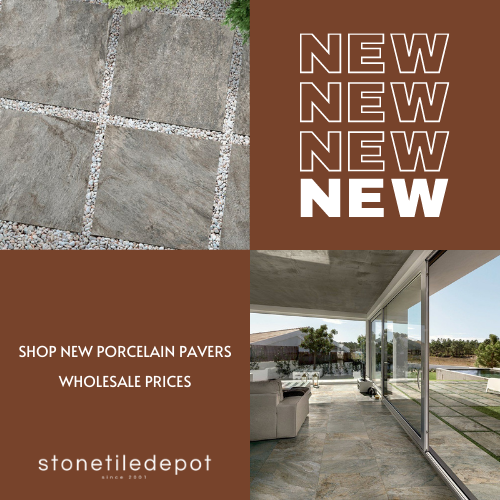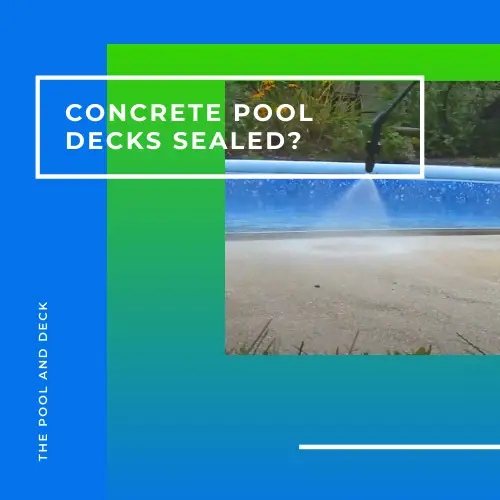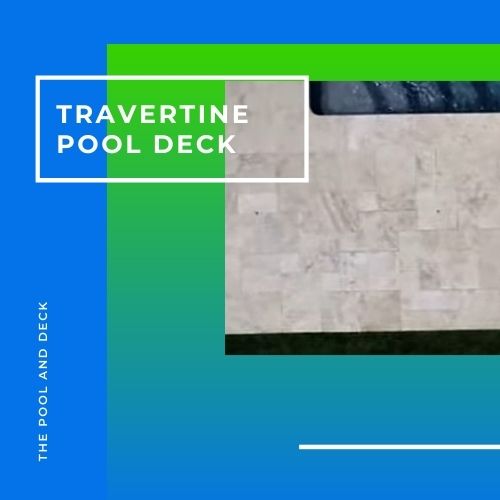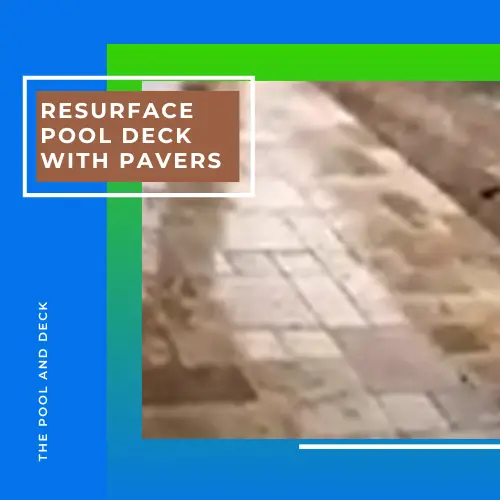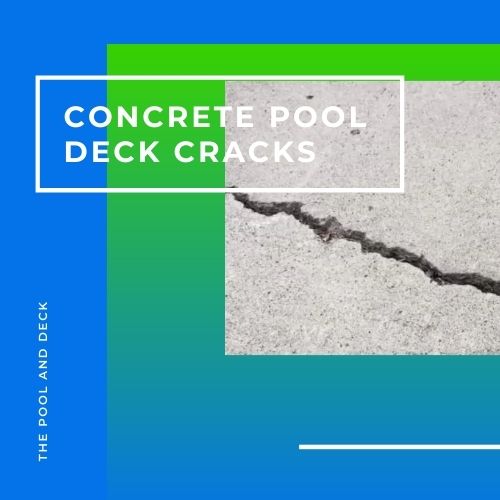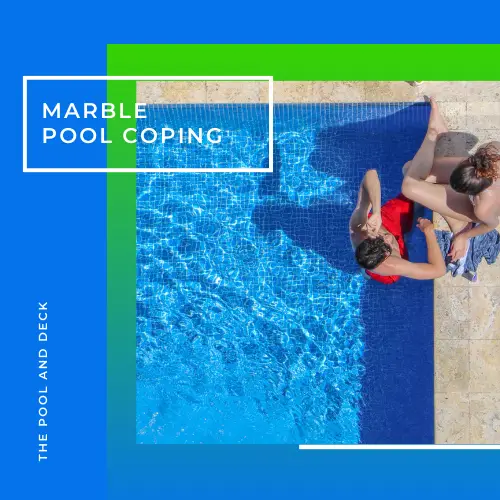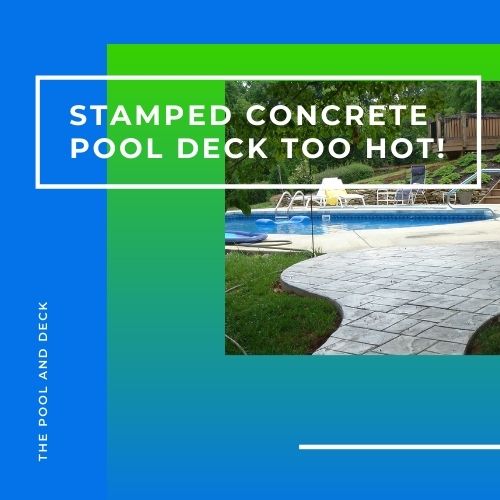Is Honed Concrete Slippery? (Best Tips You Need to Know!)
As an Amazon Associate, I earn from qualifying purchases.
Table of Contents
Is Honed Concrete Slippery?
There are so many possibilities, even with concrete pool decks. You could go for a budget friendly brushed concrete deck or a more expensive stamped concrete luxurious look. You could also take the middle path. A honed concrete pool deck. But is honed concrete slippery?
Honed concrete is a type of polished concrete. Polished concrete is slippery, when wet but honed concrete is not slippery, even when it is wet. Honed concrete uses a “grind & seal” process. Non-slip agents are added to the sealer to make honed concrete less slippery, even when wet.
Polished concrete does look beautiful and is very easy to clean and maintain. No wonder, it is used extensively in commercial establishments with moderate to heavy foot traffic, such as shopping malls.
However, honed concrete is preferred for outdoor applications such as pool decks because it is not slippery even under wet conditions.
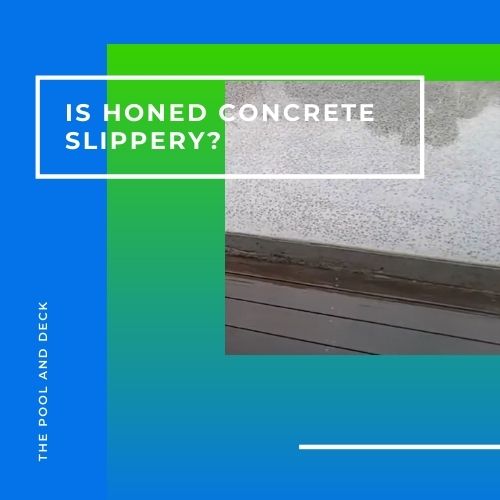
In this post I explain what honed concrete is, how it differs from polished concrete and why it is a good choice for pool decks.
What Is Polished Concrete?
Once a concrete slab has been poured and given the 4 weeks of curing time, the surface is as hard as it will get. The smoothness of the surface depends on the expertise of floating the concrete at the pour stage.
The smoothness of the concrete surface can be improved by grinding it with a grinding wheel with diamond pads. Each subsequent pass uses a finer grade pad so that the surface gets progressively smoother. It is even possible to get a mirror finish.
The decorative beauty of polished concrete depends on designs or patterns that you wish to incorporate on the pool deck. Some possibilities are:
Natural Look
No color or other additives are added. The natural concrete slab is polished. This is known as “Cream Polished Concrete”. The natural variations of the concrete color get highlighted giving the pool deck a marble like finish.
In this process the surface is just polished. No material is removed, in other words there is no “cutting”.
Salt & Pepper Look
In this process there is a slight “cutting” of the top layer so that the fine particles are exposed. As the name suggests, the look is random specks of white, gray and black.
Adding Color to Concrete
You can add the color of your choice to the cement mix so that the final polished concrete pool deck is not a boring industrial gray. If you want to play with color gradients then you can broadcast the color after the concrete pour or use stains.
Adding & Exposing Aggregates
In this process, hard colored aggregates such as flint stones are added to the concrete mix. After curing, the concrete surface is ground deep enough to expose the aggregates. Polishing ensures the entire surface, including the aggregates, is super smooth.
Depending on aggregate color, size and mix you can get some eye-catching terrazzo effect.
What’s the Difference Between Honed and Polished Concrete?
The starting point of both Honed and Polished Concrete is the same. Both are cut and ground to a desired finish. The cutting can range from no cutting resulting in no exposure of the aggregate to deep cutting for full exposure of the aggregates.
A topical sealer is applied on honed concrete. The sheen level of the topical sealer could be matt, satin or gloss. Anti-slip or non-slip additives can be added to the sealer to make honed concrete non slippery.
As honed concrete is slip resistant, even when wet, it is suitable for outdoor applications such as patios and pool decks. The sealant film is quite hard wearing and can last 2-7 years depending on the sealer.
Polished concrete on the other hand does not have a sealer coat. The smooth surface is attained purely by mechanical grinding. The process incorporates grouting and chemical hardeners, to improve the durability and appearance of the floor.
Mechanically polished concrete is suitable for indoor applications as it can become slippery when wet.
Is Honed Concrete Expensive?
Honed concrete is cheaper than polished concrete as the labor involved in honing concrete is less than the labor involved in polishing concrete. The smoothness, finish and gloss of honed concrete is achieved by “grind & seal”. It is the sealant which gives the finishing properties.
However, the smoothness, finish and gloss of polished concrete is achieved completely by the process of grinding and repeatedly polishing the concrete surface, mechanically. This is both labor intensive and time consuming.
Typically, the per square feet cost of polished concrete will be 50% higher than that of honed concrete.
Cost is another reason honed concrete is preferred for outdoor applications, such as patios or pool decks, whereas polished concrete is preferred for indoor applications, such as offices and shopping malls.
Recommended Concrete Sealers
Best Penetrating Concrete Sealer
The Armor SX5000 WB is a water-based Department of Transportation approved Silane-Siloxane penetrating concrete sealer. It penetrates deep into the substrate where it chemically reacts to form a hydrophobic barrier within the pores that reduces the absorption of water by up to 95%. Protects concrete, from within, without changing the look or feel of the surface.
Foundation Armor SX5000 Water Based Silane Siloxane Penetrating Concrete Sealer
Best Topical Concrete Sealer
The Armor AR350 is a solvent based acrylic wet look sealer that is designed to seal, enhance, and protect a variety of interior and exterior concrete and concrete paver surfaces.
The Armor AR350 penetrates deep into the surface where it chemically bonds to the pores of the concrete and pavers, creating a long lasting, non-yellowing, breathable finish that enhances dull or faded surfaces by creating a darkened wet look, and low gloss finish.
Foundation Armor AR350 Solvent Based Acrylic Wet Look Concrete Sealer
Thank you very much for reading the post. I do hope you found it informative and helpful.

